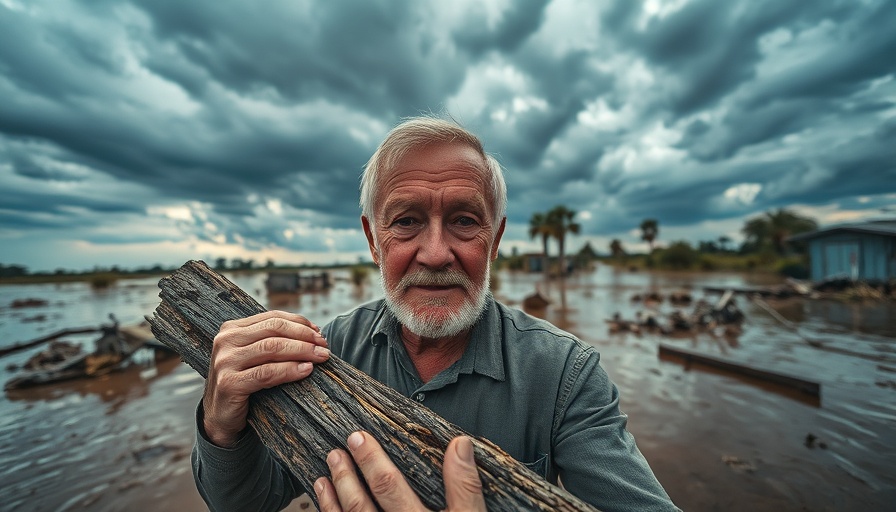
A Mother of Five Defies Nature's Fury
As floodwaters recede and the streets of Texas begin to dry, the daunting aftermath reveals not only destruction but remarkable resilience. Meet Rachel Baker, a mother of five, who faced an unforgettable challenge when torrential rains swept through her community, leaving her home nothing more than a memory. The images of her once beautifully crafted cabin now lie in ruins, a testament to the ferocity of natural disasters and the power they hold over our lives.
The Devastation: More Than Just Property Loss
Baker's story is not just about a mother returning to a shattered cabin—it's about the emotional weight of loss and the indispensable spirit of survival. With her children’s toys scattered in the mud and cherished family photographs ruined, Rachel faces a painful reality. “It feels like we lost a part of ourselves,” she explains, embodying the sentiment of many affected families. Beyond the physical damage, these catastrophic events challenge the emotional and psychological well-being of survivors, raising important questions about support systems and community strength.
Confronting Challenges: What Does the Future Hold?
As recovery efforts kick in, parallels can be drawn to broader issues that permeate the national ethos. The impacts of climate change—resulting in more frequent and intense weather events—raise profound concerns. Baker symbolizes countless families grappling with these realities in America today; she stands at the intersection of local struggle and national discourse about environmental policies and disaster preparedness. Understanding her plight is crucial as communities work to build resilience in the face of escalating natural calamities, an effort that demands urgent attention amid the rhetoric of climate change news.
Lessons in Community and Recovery
The journey does not just end with survival but expands into the realm of recovery. Baker's community has come together in extraordinary ways, highlighting the importance of social connection during crises. Neighbors have rallied to assist families like hers with food and supplies, reminding us that community support can be a vital lifeline in chaotic times. Such acts of kindness exemplify the human spirit's capacity to rebuild amidst adversity—a collective rebuilding that transcends the personal to heal a bruised community.
The Broader Implications: National and Local Perspectives
Houston, once again in the news for weather-related catastrophes, raises awareness about the current events in America concerning infrastructure and funding dedicated to disaster relief. The lessons learned from cases like Baker's extend beyond Texas, prompting national discussions on how the government approaches climate issues, infrastructure investments, and community disasters. Addressing these interconnected challenges is not merely about local recovery but encompasses broader debates surrounding legislative actions and funding for environmental resilience as seen in current political news USA.
This difficult time for families like Rachel's unveils stark realities about poverty statistics and unemployment that leave communities vulnerable when disasters strike. As Baker looks towards rebuilding, her future is tied not only to her efforts but to larger economic and federal initiatives to promote stability and recovery in disaster-prone regions. Indeed, these conversations are essential as we contemplate the cascading effects of climate change and our responsibility to foster resilience.
A Call for Change: What Can We Do?
There is a growing need for actionable insights and policies that safeguard families from the harsh realities displayed in Rachel Baker's life. Community members and political leaders must galvanize efforts to enact change. This includes improved infrastructure, policy initiatives for better disaster response, and a clear focus on climate change implications that impact real families and homes. This is not just a matter of policy but a matter of compassion and humanity. Understanding and acting upon these insights is paramount for continued peace and recovery.
The story of Rachel Baker, like many others, is a reminder that the strength of the human spirit can prevail when faced with adversity. However, the collective responsibility to foster an environment where resilience can flourish rests on all of us. As we digest these national news headlines, let us advocate for systems that not only respond to disasters but also prevent their occurrence. The time for action is now, not just for those devastated today but for generations to come.
 Add Element
Add Element  Add Row
Add Row 



 Add Row
Add Row  Add
Add 


Write A Comment